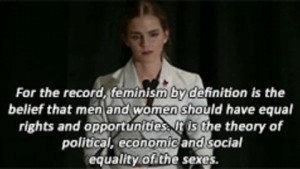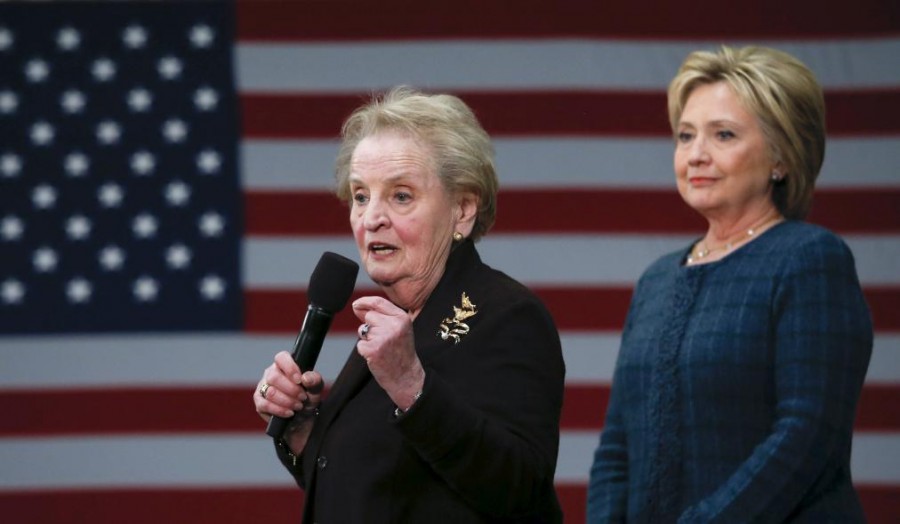Being a Feminist Doesn’t Mean Young Women Should Vote for Hillary
Photo Credit/ REUTERS
Former U.S. Secretary of State Madeleine Albright endorses Hillary Clinton in New Hampshire February 6, 2016. Phot credit: Reuters/Adrees Latif
February 29, 2016
Recently, former Secretary of State and feminist icon Madeleine Albright repeated a remark that has aggravated many feminists across the nation, especially millennials.
On Feb. 7, at a Hillary Clinton rally in New Hampshire, Albright said her controversial line, “There’s a special place in hell for women who don’t help other women.”
The former Secretary of State has reiterated this quote for over 40 years; however, this time, she angled the statement so that it referred to the young female electorate that is currently not voting for Clinton.
Though Albright remarked to the press that she was “taken out of context,” one issue remains—being a feminist does not mean that young women like myself must vote for Hillary Clinton.
Feminism is a broadly interpreted term that has changed drastically since the advent of the feminist movement during the 1960s and 1970s. For many older generations of Americans, the word “feminism” can have a negative connotation, associated with bra-burning and man-shaming.
However, the current generation of young women truly do not identify with this image of feminism, and instead interprets the term simply as an advocacy for the equality of men and women. Many feminist ideals today include advocating for equal pay, ending the oversexualization of the female body, and ensuring the rights and fair treatment of victims of sexual assault, all in the interest of equalizing the sexes.
Yet, when an exceptionally powerful woman like Madeleine Albright makes a comment like she did, feminism in its true definition can be distorted.
Being a woman who identifies as a feminist shouldn’t determine political vote. Carefully considering each candidate, his or her platforms, policies, and actions, independent of gender, is an action that truly represents feminism’s current definition. If women do not believe Hillary Clinton is the best candidate, then they should by no means be held responsible for voting her into office. Neither should women be shamed into voting for another candidate whose platforms they embrace, even if that candidate is a man.

As young women, it is especially important to keep in mind that voting for a woman just because she is a woman is in fact contrary to the feminist ideal. That action can be equated to a man not voting for a woman just because she is a woman. Evaluating a person solely based on their gender, whether it be a politician, businessperson, teacher, or ANY person, is inherently anti-feminist and sexist.
This is not to say that it wouldn’t be a remarkable feminist achievement if a woman was voted into the highest office in the United States, arguably the world’s foremost political superpower. However, women should not necessarily vote for Hillary just because of her historical potential from a gender perspective. Women, and men for that matter, should vote for whoever they believe will be the best person to direct an entire branch of our government, no matter what their gender.
That person may or may not be Hillary Clinton—that is a matter of political opinion. The fact is that her gender should not sway my vote as a young woman, nor should it sway anyone else’s.
Being a feminist means that I value men and women equally, but it does not mean that I must vote for Hillary.



Colleen Waltman • Mar 4, 2016 at 12:49 pm
Love this article!
Kelly French • Mar 4, 2016 at 12:47 pm
Very true! Nice article
Meghan collins • Mar 4, 2016 at 12:47 pm
Totally support this! Awesome!
Kyleigh Dalkin • Mar 4, 2016 at 10:42 am
This is a really interesting article and I really like it. Good job!
Areeba • Mar 4, 2016 at 10:40 am
I agree with this statement, just because Hillary is a woman, doesn’t mean you have to vote for her. Vote for who’s ideals you agree with.
Viv • Mar 4, 2016 at 10:40 am
I think this is a great article! Awesome job!
Joan Kitchie • Mar 4, 2016 at 10:22 am
Love this piece. I completely agree.